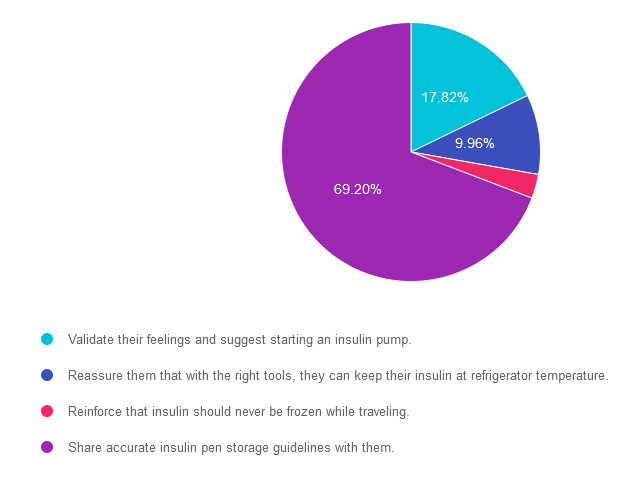
For last week’s practice question, we quizzed participants on carrying insulin. 69% of respondents chose the best answer. We want to clarify and share this important information, so you can pass it on to people living with diabetes and your colleagues, plus prepare for exam success!
Before we start though, if you don’t want any spoilers and haven’t tried the question yet, you can answer it below: Answer Question
Question: JL has new type 1 diabetes and their time in range is about 40%. They tell you that carrying insulin pens around on ice is such a hassle that they don’t give insulin before eating out.
What is the best response?
Answer Choices:
- Validate their feelings and suggest starting an insulin pump.
- Reassure them that with the right tools, they can keep their insulin at refrigerator temperature.
- Reinforce that insulin should never be frozen.
- Share accurate insulin pen storage guidelines with them.

Getting to the Best Answer
If you are thinking about taking the certification exam, this practice test question will set you up for success. Test writers anticipate possible answers based on the details in the question. They will wave those “juicy answers” right under your nose. Your job is to weed through the particulars, pluck out the most important elements and choose the BEST answer.
Answer 1 is incorrect. 17.82% chose this answer. “Validate their feelings and suggest starting an insulin pump.” Although this answer is tempting, it’s not the best answer. The first part of the answer that suggests validating their feelings is accurate. However, we would want to explore accurate insulin pen storage options before suggesting switching over to an insulin pump. Please see our insulin storage guidelines cheat sheet for more information.
Answer 2 is incorrect. 9.96% of you chose this answer. “Reassure them that with the right tools, they can keep their insulin at refrigerator temperature.” Once the person uses the insulin pen for the first time, it no longer needs to be refrigerated. Each type of insulin pen has storage guidelines for insulin kept at room temperature. Please see our insulin storage guidelines cheat sheet for more information.
Answer 3 is incorrect. About 3.01% of respondents chose this. “Reinforce that insulin should never be frozen.” It is true that insulin should never be frozen, but this is not the best answer. We also want to follow up with accurate and safe insulin pen storage information.
Finally, Answer 4 is correct. 69.20% chose this answer. “Share accurate insulin pen storage guidelines with them.” Yes, this is the best answer! Once insulin pens are used for the first time, they can be stored at room temperature. Of course, users have to avoid letting them overheat at temperatures of 86 degrees Fahrenheit or greater or getting too cold. Either situation can damage the insulin molecule. Please see our insulin storage cheat sheet for more information and feel free to share this info with colleagues and people with diabetes alike.
We hope you appreciate this week’s rationale! Thank you so much for taking the time to answer our Question of the Week and participate in this fun learning activity!
ReVive 5 Diabetes Training Program
“ReVive 5 Program is the best program I have ever attended – should be required for all diabetes educators! Thank you so much for translating this research into practical approaches!!” – Sarah F.
Save $100! Enroll now to watch the webinar on-demand

ReViVE 5 Diabetes Training Program:
Unlocking Hidden Barriers to Diabetes Management
Enroll Now and Save $100!
Recorded & Ready to Watch
Addressing diabetes distress can be challenging, even for seasoned healthcare professionals.
We invite you to attend this hands-on training program that provides the essential steps to address diabetes distress combined with an innovative approach to glucose management.
Team of Experts: ReVive 5 is taught by a team of 3 Interdisciplinary Experts:
Lawrence Fisher, Ph.D., ABPP, Professor Emeritus, UCSF
Susan Guzman, PhD
Beverly Thomassian, RN, MPH, CDCES, BC-ADM
Accredited Training Program:
- 15.0 CEs – Includes the 7-hour ReVive 5 Training Program, Certificate, and 5 FREE bonus courses to supplement content.
- A comprehensive set of assessment tools, educational materials, log sheets, and resources.
“ReVive 5” breathes new life into our relationship with diabetes, bringing a fresh perspective to both the person with diabetes and the provider.
All hours earned count toward your CDCES Accreditation Information
Sign up for Diabetes Blog Bytes – we post one daily Blog Byte from Monday to Friday. And of course, Tuesday is our Question of the Week. It’s Informative and FREE! Sign up below!
The use of DES products does not guarantee the successful passage of the CDCES exam. CBDCE does not endorse any preparatory or review materials for the CDCES exam, except for those published by CBDCE.









